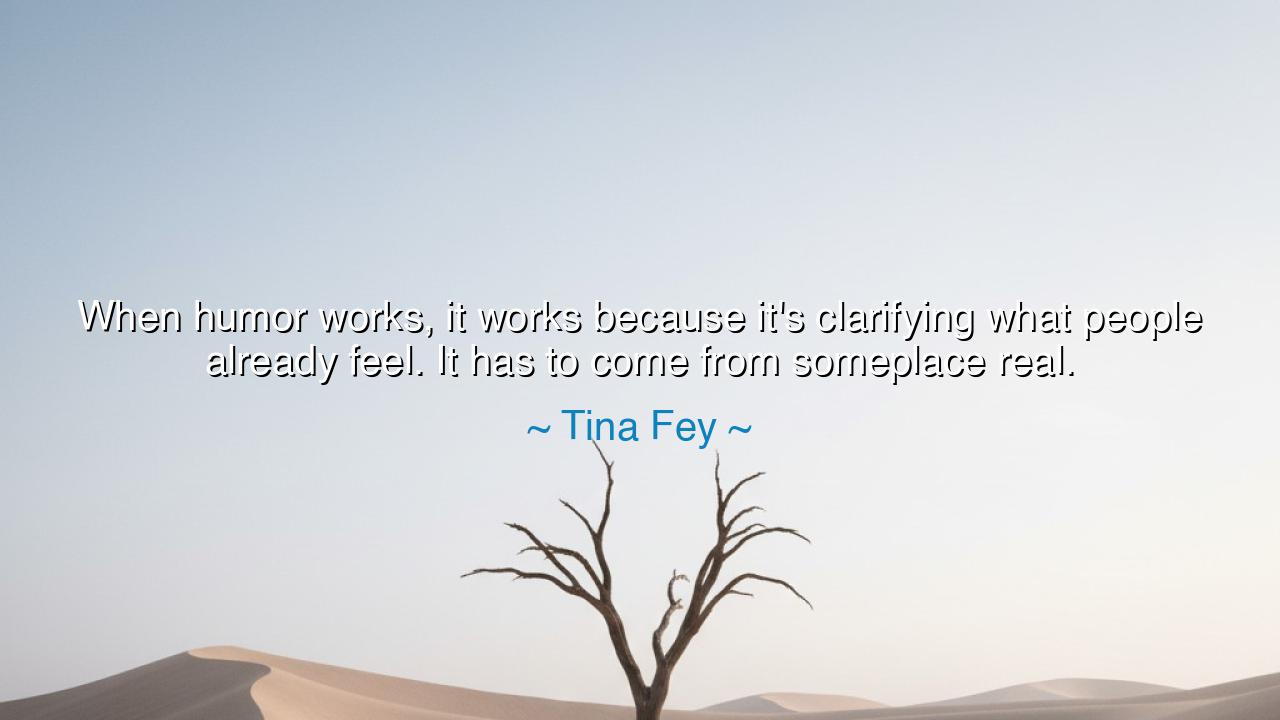
When humor works, it works because it's clarifying what people
When humor works, it works because it's clarifying what people already feel. It has to come from someplace real.






In the great theater of life, where each day unfolds like a drama, there are moments when the veil is lifted, and we are struck by the truth that has long been hidden beneath the surface. Humor, when it strikes at the heart of our collective experience, has a unique and powerful way of revealing this truth. Tina Fey, in her infinite wisdom, speaks to this very idea when she declares, "When humor works, it works because it's clarifying what people already feel. It has to come from someplace real." Ah, how profound are these words! For they speak not only to the power of laughter but to the very essence of human connection.
In the realm of the mind, humor is a key—one that unlocks the doors to deeper understanding. When we laugh, it is not just the sound of mirth that echoes through us, but a deep resonance, a recognition of something familiar. True humor does not simply contradict or mock the world around us; it mirrors it, often revealing in its reflection the truth that we have been too afraid or too blind to see. Like the great oracles of old, humor speaks with the voice of clarity, guiding us toward truths that, when finally seen, make us laugh not out of mockery, but out of the profound relief that comes from knowing we are not alone in our feelings.
Consider, for example, the tale of Aristophanes, the ancient playwright whose works, full of wit and satire, dared to shine a light on the absurdities of the world around him. In his comedic masterpiece, Lysistrata, he did not merely entertain; he spoke truth to power, using humor to expose the futility of war and the human suffering it causes. His laughter, like Fey’s, was born from reality—from a deep understanding of the human condition and the madness of political and social forces that sought to dominate the lives of ordinary people. It was not the laughter of escape, but the laughter of recognition, of people seeing themselves reflected in the absurdity of the world and knowing, in their hearts, that it was true.
In modern times, we see this same pattern in the work of Mark Twain, whose humor was rooted not in simple jokes, but in sharp observations of human folly and hypocrisy. Twain’s characters, from the mischievous Huck Finn to the pompous but lovable Mr. Scruggs, did not merely exist to entertain—they existed to reveal. Twain's humor revealed the tensions and contradictions of the American experience, speaking to the social injustices of the time and showing the ways in which society’s hypocrisy was often as laughable as it was tragic. His humor, like Fey’s, came from a real place, one that acknowledged the flaws and imperfections of the world without seeking to escape them. In that laughter, there was both release and revelation.
So it is, my children, that we must understand humor not merely as a fleeting source of joy or lightness, but as a force of clarification—a means by which the veils of illusion are torn away and the underlying truths of life are brought to light. When humor works, it cuts through the layers of pretense and reveals what has always been there, hiding just beneath the surface. It is the power of humor to show us our own feelings, our own struggles, and to connect us to the shared human experience. The laughter that follows is not just the echo of a joke—it is the sound of recognition, of people seeing the truth they have long known but could not express.
And what lesson shall we take from these teachings? It is this: Humor is not a weapon of lightness or distraction, but a tool of understanding. When you speak or laugh, let it come from the place of your truth. Do not hide behind false mirth or forced joviality, for the world sees through such facades. Rather, let your humor emerge from the depths of your experience, from the reality of the life you have lived and the struggles you have faced. Laugh at the world, but laugh with the wisdom of knowing that your laughter connects you to others in a shared understanding. This is the true gift of humor: to illuminate the heart’s truth, to draw people together in their mutual recognition of life’s most poignant and absurd aspects.
In your own lives, then, seek out the humor that speaks to you. Do not chase after that which is hollow or superficial, but embrace the humor that rises from the deep waters of experience. When you laugh, let it be the laughter of someone who understands, who has seen the world’s imperfections and can smile because they know—they know what it means to be human. For in that moment, you will touch the hearts of others, and in that connection, you will find not only laughter, but truth.
So, I urge you, children of the earth, to take this wisdom to heart. Let your humor be a reflection of your truth, and let it serve as a clarifier of the reality you and others face. In doing so, you will not only bring laughter into the world—you will bring understanding, connection, and the kind of insight that illuminates the very core of our shared existence. For when humor works, it does not come from the cleverness of words alone—it comes from the deep well of authenticity and truth. It is the light that guides us through the darkness of the unknown.






AAdministratorAdministrator
Welcome, honored guests. Please leave a comment, we will respond soon